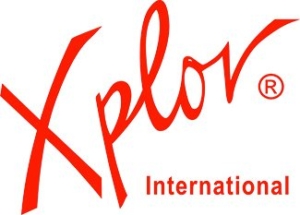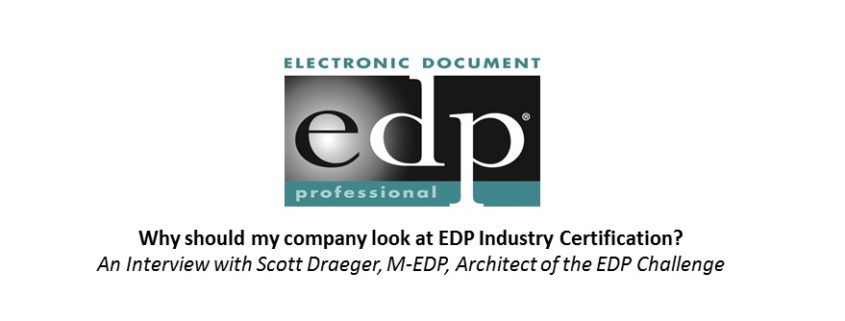How can my company leverage industry certification?
Scott Draeger, Vice President of Customer Transformation at Quadient has been a huge proponent of industry certification, he himself a designated Master Electronic Document Professional (M-EDP). Over the last several years, Quadient has invested both time and financial resources promoting industry certification within the company.
I wanted to circle back with Scott to get his thoughts on the impact within his organization and whether he feels the investment has paid dividends.
Skip: Scott, thank you for taking the time to speak about industry certification
Scott: I can always find time to speak about industry certification, because it is most important when an industry is changing. Our industry is changing rapidly, so industry certification helps companies like Quadient prove to the market that we are up to date in our knowledge.
Skip: Quadient places a great deal of value on industry certification. Quadient now has 188 designated or certified professionals. What percentage of total employees is that? Why is industry certification important to you and Quadient?
Scott: Over 20% of Quadient’s staff has an official Designation from Xplor. I believe that makes us the most certified software vendor in the industry in both volume and percentage. But, the location of the certifications also matters. Our services team in the Americas is 100% certified, which means they bring context, knowledge and passion to all of their projects.
Skip: Can you tell me a little bit about the EDP certification program?
Scott: The EDP program is about your passion and reflecting on your place within the customer communication and document industry. This is a differentiated industry certification, because it takes review of your work by your peers to earn the EDP or M-EDP designation. It is harder to earn than a purely test-based certificate, because it requires written samples that show the application of practical knowledge to real-world document projects.
Skip: What value does it present to your customers and prospects?
Scott: When we discuss implementations with our customers and prospects, we proudly feature our team’s participation in the EDP program to show that we understand context. The EDP matrix considers “Document Production Journey” and “Document Application Development Lifecycle” and values diversity of experience with technology and business needs. This means that our customers and prospects are assured that we understand the tools, technology and context of their communication projects.
Some people may not know just how much effort Xplor puts into keeping the EDP certification relevant. The matrix has been updated by a very active committee to add mobile and web channels, as well as analytics. There are more opportunities to reward skills in business acumen and knowledge sharing. The certification committee makes sure this is a current reflection on the skills and technologies needed, and the reviewers are open to learning about new technology in the submissions.
Skip: You include certification statistics in your proposals. What impact does it have? How does it differentiate Quadient from your competitors?
Scott: This is an interesting question. One of the common responses is, “what is an EDP?” We love that one, because it lets us talk about how the EDP program is a way for us to ensure development of our people. It differentiates us from competitors because it shows that we have awareness of how we can best use new approaches to solve business problems of communication. We list this in our RFP responses and proudly present this to any customers and prospects.
Skip: What has been the reaction/feedback from your employees?
Scott: My coworkers at Quadient seem to value the program. I have personally been the mentor for about eight of them in the past four years. Every year, we have a kickoff presentation to explain the program, and we usually get 50-100 people on that first call. Of course, it’s been running for four years, so we are getting the new people into the EDA program as soon as possible. The first crop of EDAs are starting to consider their EDP next year.
Skip: In closing, what message do you have for individuals and company’s regarding industry certification?
Scott: At the rate business and technology change, it is important to pursue certification for a few reasons. First, earning a certification shows your peers and managers that you are serious about the industry. Second, the process of pursuing a certification reminds you that you don’t, in fact know everything. This does wonderful things to expand your thinking, at a minor cost to your pride. Lastly, earning a certification is a potential differentiator in a job market that is rapidly changing in terms of both business models and technology. I recently earned a CCXP (Certified Customer Experience Professional) certificate from CXPA (Customer Experience Professionals Association) to augment my M-EDP to show that I have made progress in studying the CX literature.
Skip: Scott, once again, thank you for taking the time and congratulations on your success. Anyone interested in obtaining additional information about the EDP certification program can visit www.xplor.org/edp or call Xplor International at 813-949-6170.
Scott: Anytime, Skip! I recommend the program to anyone in the document and customer communication industry, because it will change your perspective. The EDP program is a wonderful opportunity to reflect on your abilities and experiences. I believe this frame of mind is essential for long term career success, because it gives you a chance to see what areas you can grow into as you steer your career. Also, it can get you a chance to shake Skip’s hand on stage at Xplor 2020!
Until next time! Take care.

Skip Henk, EDP
President/CEO
Xplor International


